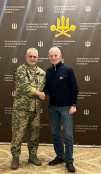Meet the Heads of Administration - Sylvie Sattin

Sylvie Sattin - French - EU Delegation to Rwanda
What is your background and what did you do before becoming a Head of Administration?
I studied accounting in France. I worked as a chartered accountant and auditor for 10 years in France and Reunion Island. I moved with my family to Niger and then to Zambia where I had the opportunity to work as a local agent in the contracts/finance/audit sections of the European Union Delegations in Niamey and Lusaka. This is where my desire to become Head of Administration in a Delegation started. After a few years in Brussels as a contractual financial agent at RTD and EASME, EPSO launched the first competition for Heads of Administration in Delegations. An opportunity of a lifetime!
In a nutshell, how would you describe the role of Head of Administration in an EU Delegation?
In short, the Head of Administration (HoA) is the Manager of resources within the Delegation.
Human resources: He or she welcomes expatriate colleagues and helps them settle into their new life so that they can quickly perform well in their new position. He/she recruits local staff if necessary, and manages their personal files (leave, absence, training, pay, evaluation, promotion, medical cover, etc.). The HoA is him/herself in charge of a team of 10 to 15 local staff within the administrative section of the Delegation.
Financial resources: The HoA is also the imprest administrator and manages the administrative budget (2 to 3 million euros per year depending on the size of the Delegation). He/she is responsible as auditor for the administrative expenditure of the Delegation, administers each expenditure according to its amount and verifies the application of the European financial regulations.
Logistical resources: The HoAs manage the building housing the Delegation's offices, the Ambassador's Residence, the expatriates' houses and the fleet of vehicles. He/she is responsible for the inventory of all assets. They launch calls for tender for equipment and services and manage the resulting contracts on a daily basis (purchase of equipment, IT, security services, cleaning, maintenance, etc.).
They assist colleagues in the preparation of high-level visits from headquarters, ensure the logistics of the Delegation's visibility events such as the 9 May celebration, and participate in the coordination of the Schengen network with the Member States present in the country.
The Head of Administration has a privileged relationship with the Head of Delegation (Ambassador) whom he/she assists on a daily basis with all administrative aspects. He/she participates in the weekly management meetings.
The Head of Administration is a key element within the Delegation. His availability, enthusiasm and dynamism contribute to creating a serene atmosphere where everyone can find their place.
What is the most satisfying part of your job?
Indepedence! The job of Head of Administration in a Delegation is the only one at AST level where it is possible to carry out a real professional project over several years with a team of 10 to 15 people devoted to serving others.
Why should people apply to work for the EU and in particular for the job of Head of Administration in an EU Delegation?
To serve two purposes at the same time: their vocation to serve the Development of disadvantaged countries and their vocation to serve their colleagues and make life at work pleasant.
How do you handle /how do you see the frequent rotation and opportunities for professional growth in EU Delegations / in the EEAS?
Each job is different, offering new challenges and opportunities. You bring knowledge and expertise from previous positions and learn new ways of doing things. It is sometimes frustrating to leave with the impression that you have not 'finished' your project. But you can be sure that your successor will take over!
What are the advantages of working in a diverse environment like the one of EU Delegations?
Most of the Delegations are small structures with a maximum of 50 employees, everyone knows each other, they rub shoulders, it's a big family. From the Ambassador to the driver. They are also the only structures within the European Institutions that work with national employees of the host country. This greatly enriches working relationships.
What do you find difficult in turn?
Taking off and leaving colleagues with whom you have shared so much over the years!
See also:
The EU is looking for Heads of Administration in EU Delegations





